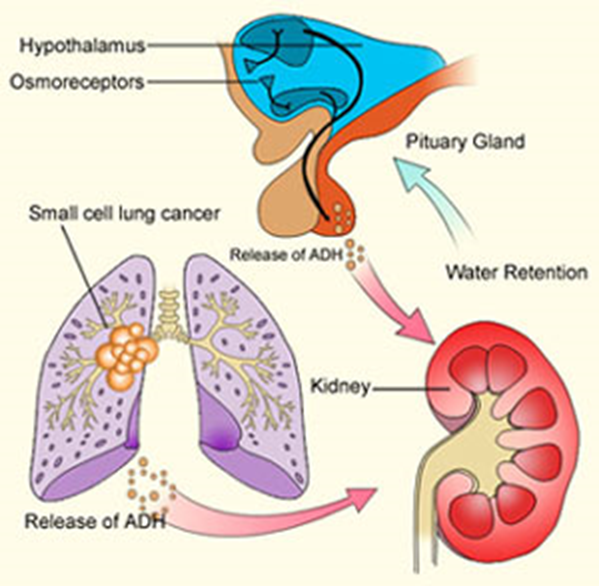A nurse is providing education about insulin management to a client newly diagnosed with type 1 diabetes mellitus. Which of the following statements by the nurse about injection site selection is accurate?
Injections will work most quickly when given in the thigh.
Injections will work most quickly when given in the upper arm.
Injections will work most quickly when given in the buttocks.
Injections will work most quickly when given in the abdomen.
The Correct Answer is D
Choice A reason:
Injections in the thigh are absorbed more slowly compared to the abdomen. The thigh is a common site for insulin injections, but it does not provide the fastest absorption rate. The absorption rate can be influenced by physical activity, as exercise can increase blood flow to the muscles, potentially speeding up insulin absorption. However, under normal conditions, the thigh is not the fastest site for insulin absorption.
Choice B reason:
Injections in the upper arm have a moderate absorption rate. The upper arm is another common site for insulin injections, but it is not the fastest. The absorption rate from the upper arm is generally faster than the thigh but slower than the abdomen. This site can be convenient for injections, especially for those who find it difficult to reach other areas.
Choice C reason:
Injections in the buttocks have the slowest absorption rate among the common injection sites. The buttocks are less commonly used for insulin injections due to the slower absorption rate and the difficulty some individuals may have in administering injections in this area. The high fat content in the buttocks slows down the absorption of insulin.
Choice D reason:
Injections in the abdomen provide the fastest absorption rate for insulin. The abdomen is the preferred site for many people with diabetes because it has a large surface area and is easy to access. The insulin injected into the abdominal area is absorbed quickly into the bloodstream, making it the most effective site for rapid-acting insulin. This is particularly important for managing blood sugar levels around meal times.

Nursing Test Bank
Naxlex Comprehensive Predictor Exams
Related Questions
Correct Answer is A
Explanation
The correct answer is a) Serum potassium levels.
Choice A reason:
Serum potassium levels are crucial to monitor in clients with hypervolemia, ketoacidosis, and metabolic acidosis. Potassium imbalances are common in these conditions due to shifts between intracellular and extracellular compartments. In diabetic ketoacidosis (DKA), for example, insulin deficiency and acidosis cause potassium to move out of cells, leading to hyperkalemia. However, once treatment with insulin begins, potassium shifts back into cells, which can cause hypokalemia. Both hyperkalemia and hypokalemia can have serious cardiac implications, making it essential to monitor and manage potassium levels closely.
Choice B reason:
Serum calcium levels are important for overall health, but they are not the primary concern in the context of hypervolemia, ketoacidosis, and metabolic acidosis. While calcium imbalances can occur, they are less common and less immediately life-threatening compared to potassium imbalances. Monitoring calcium is still necessary, but it does not require the same level of immediate intervention.
Choice C reason:
Serum sodium levels are also important to monitor, especially in conditions like hypervolemia where fluid balance is disrupted. However, sodium imbalances are typically managed through fluid management and do not pose the same immediate risk as potassium imbalances in the context of ketoacidosis and metabolic acidosis. Hyponatremia or hypernatremia can cause neurological symptoms, but these are generally less acute compared to the cardiac risks associated with potassium imbalances.
Choice D reason:
Blood urea nitrogen (BUN) levels provide information about kidney function and hydration status. Elevated BUN can indicate dehydration or renal impairment, which are relevant in the context of hypervolemia and ketoacidosis. However, BUN levels do not require the same level of immediate intervention as potassium levels. Monitoring BUN is important for overall management but is not the primary concern in acute settings.
Correct Answer is B
Explanation
Choice A Reason:
Conivaptan hydrochloride is a vasopressin receptor antagonist used to treat hyponatremia in patients with SIADH. It works by blocking the action of vasopressin, thereby promoting water excretion without significant loss of sodium. This helps to correct the water imbalance caused by SIADH. Conivaptan is typically administered intravenously and is effective in increasing serum sodium levels.
Choice B Reason:
Vasopressin, also known as antidiuretic hormone (ADH), is contraindicated in patients with SIADH because it exacerbates the condition. SIADH is characterized by excessive release of ADH, leading to water retention and hyponatremia. Administering vasopressin would further increase water reabsorption in the kidneys, worsening the hyponatremia.
Choice C Reason:
Sodium chloride tablets are used to manage hyponatremia in SIADH by increasing sodium intake. This helps to counteract the dilutional hyponatremia caused by excessive water retention. Sodium chloride tablets are often prescribed alongside fluid restriction to help raise serum sodium levels.
Choice D Reason:
Tolvaptan is another vasopressin receptor antagonist used to treat hyponatremia in SIADH. It works similarly to conivaptan by blocking the action of vasopressin, promoting water excretion, and increasing serum sodium levels. Tolvaptan is typically administered orally and is effective in managing SIADH.
Whether you are a student looking to ace your exams or a practicing nurse seeking to enhance your expertise , our nursing education contents will empower you with the confidence and competence to make a difference in the lives of patients and become a respected leader in the healthcare field.
Visit Naxlex, invest in your future and unlock endless possibilities with our unparalleled nursing education contents today
Report Wrong Answer on the Current Question
Do you disagree with the answer? If yes, what is your expected answer? Explain.
Kindly be descriptive with the issue you are facing.
